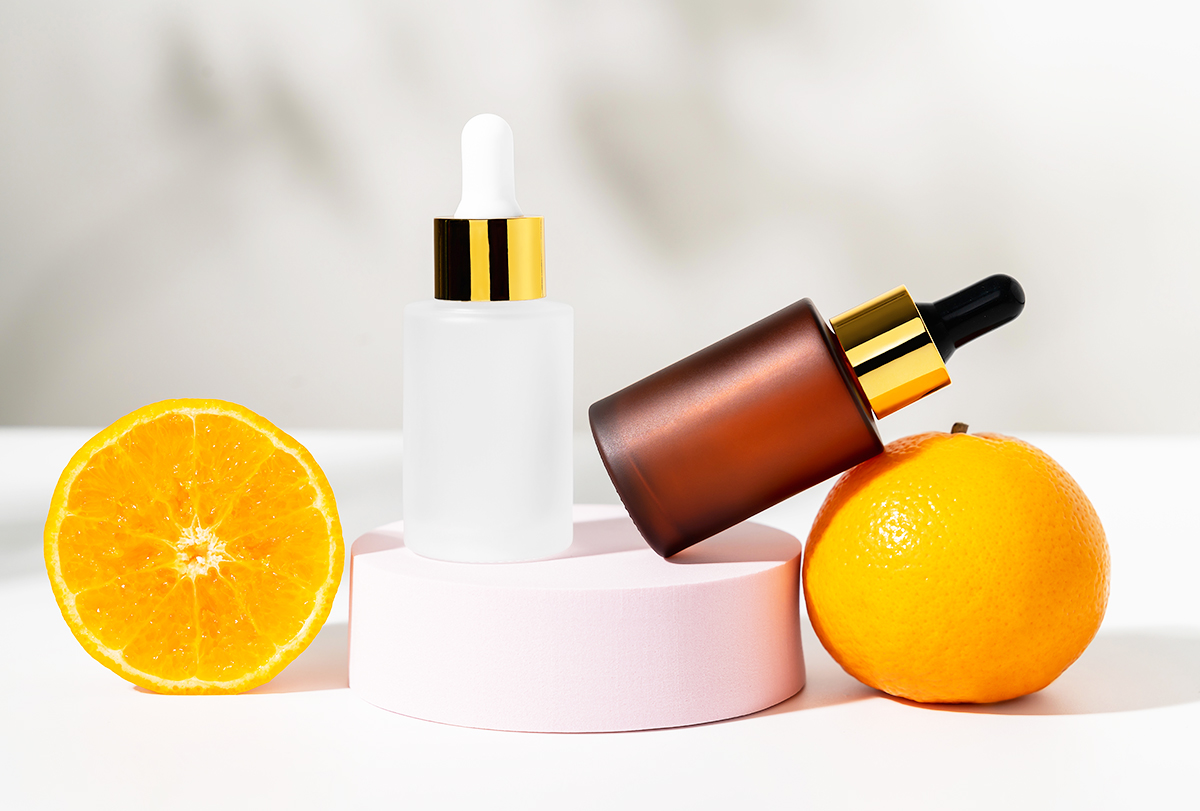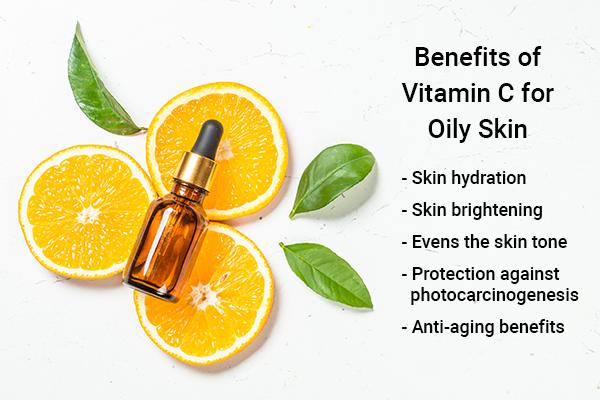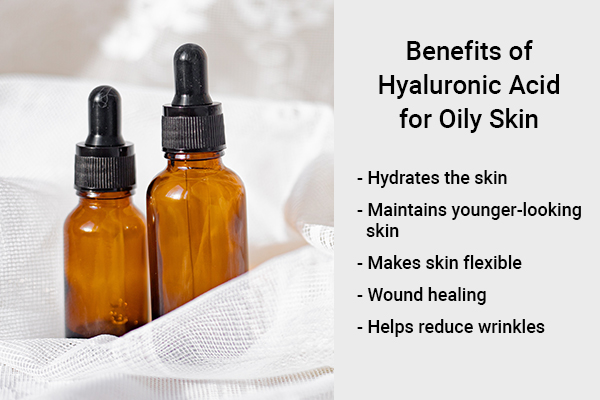In this article:
Oily skin is a common concern for many people. Excessive oil production in the skin can lead to clogged pores and various skin issues such as blackheads, acne, and pimples. (1)

Using skin care products such as hyaluronic acid and vitamin C can provide numerous benefits, according to skin care professionals. To address oily skin concerns, experts recommend using the two in combination.
However, if you have to choose only one, vitamin C emerges as the better option for oily skin. It offers numerous benefits and helps combat the challenges posed by oily skin.
Delve deeper into the uses, advantages, and disadvantages of both vitamin C and hyaluronic acid for oily skin.
Hyaluronic Acid Versus Vitamin C for Oily Skin
| Hyaluronic acid | Vitamin C |
|---|---|
| Hyaluronic acid enhances skin hydration, flexibility, and elasticity. | Vitamin C repairs and improves the skin barrier. |
| Hyaluronic acid facilitates collagen production. | Vitamin C also allows the skin to hold moisture and prevents or lowers water loss. |
| Hyaluronic acid aids in the reduction of wrinkles and fine lines over time. | Vitamin C reduces puffiness and redness on the skin. |
| Adverse effects with hyaluronic acid are not normally seen. | Vitamin C has more potential side effects. |
Hyaluronic Acid Versus Vitamin C: Which Is Better for Oily Skin?
When it comes to oily skin, it’s important to choose the right skin care products. Between hyaluronic acid and vitamin C, topical vitamin C may be a better option for oily skin. (2)
According to experts, the drying effect of vitamin C helps to regulate sebum production, reducing the greasy appearance of the skin and minimizing the risk of clogged pores.
Experts add that vitamin C, being a powerful antioxidant, can help protect the skin from oxidative stress, which causes many skin problems.
Also, while hyaluronic acid is adequate in reducing sebum production, its effectiveness may be limited when used topically compared to injectables containing hyaluronic acid. (3)
So, considering these factors, topical vitamin C can be a beneficial addition to your skin care routine if you have oily skin.
Note: If you have concerns such as signs of aging in addition to oily skin, hyaluronic acid can be a better option due to its hydrating and skin-plumping properties.
Benefits of Vitamin C for Oily Skin

Despite high doses of oral supplementation, only a small fraction of vitamin C will be biologically available and active in the skin. Therefore, for cosmeceutical purposes, external supplementation, such as topical application, is relied upon. (4)
Thus, in the cosmetic industry, topical vitamin C is preferred.
Experts claim that vitamin C helps with controlling oil or sebum production because of its anti-inflammatory activity. (2)
In fact, topical vitamin C is a proven dermatologist-trusted formulation that may benefit your skin by slowing premature skin aging, preventing photodamage, and reducing the appearance of pigmentation and acne. (5)
Here are some other benefits of adding vitamin C to your skin care routine:
1. Skin hydration
Research has demonstrated that wholesome skin has high amounts of vitamin C, which is why it can be inferred that vitamin C stimulates skin hydration and also reduces water loss from the skin. (6)
2. Skin brightening
To ensure that the skin is not looking dull or has excess pigmentation, vitamin C is the route to take. This is because it delivers a glow to your skin.
Vitamin C hinders the production of melanin, which is the pigment that is accountable for skin color and pigmentation. So, dark spots can be dealt with using vitamin C, leading to the brightening of your skin. (7)
3. Evens the skin tone
Vitamin C has anti-inflammatory and antioxidative properties. Thus, it has a skin-comforting action that decreases the puffiness and redness of the skin.
Vitamin C counteracts free radicals that may cause oxidative damage, thereby discouraging skin irritation. (8)
4. Protects against UV-induced damage and reduces signs of aging
Vitamin C-containing solutions have been shown to reduce UV-induced skin reactions and thus help fight oxidative damage caused by excessive sun exposure. For these reasons, vitamin C helps in controlling the signs of premature aging such as wrinkle formation, age spots, and hyperpigmentation.
According to experts, vitamin C is essential for collagen biosynthesis and is thought to have an antiaging effect too. Hence, it can delay the signs of aging. (4)
Benefits of Hyaluronic Acid for Oily Skin

Hyaluronic acid has also been proven by research to significantly reduce sebum secretion in oily skin by decreasing the size of sebaceous (oil-producing) glands (9) and providing hydration.
Here are some other benefits of adding hyaluronic acid to your skin care routine:
1. Hydrates the skin
The most well-known use of hyaluronic acid is for skin hydration as it has the power to retain water. Keeping the skin hydrated is very crucial because, when the skin is not hydrated sufficiently, it cracks, compromising the skin barrier and making the skin prone to damage.
For proper skin hydration, using products that contain hyaluronic acid is an excellent option. (10)
2. Makes the skin youthful looking
Hyaluronic acid is pivotal for youthful-looking skin. It can hold 1,000 times its weight in water. It plumps up the skin and thus decreases the impression of fine lines.
Moreover, it safeguards the skin from free radicals, which induce cell damage and premature aging. (10)
3. Increases skin flexibility
Hyaluronic acid is known for enhancing skin flexibility and elasticity. Thus, it decreases the impression of wrinkles and fine lines. (11)
4. Wound healing
Hyaluronic acid has also been understood to assist in accelerating the healing of wounds. It does so by lessening inflammation and facilitating cell regeneration, which are vital for wound recovery. (12)
5. Reduces wrinkles
Hyaluronic acid facilitates collagen production, which is critical for providing the skin its structural strength. Hence, the skin can maintain its firmness and can evade wrinkles and fine lines. (13)
Is It Safe to Use Both Vitamin C and Hyaluronic Acid Together?
If you’re trying to find the best combination of products for skin care, especially for oily skin, consider using hyaluronic acid and vitamin C. Incorporating both ingredients in your regimen greatly benefits skin health.
Hyaluronic acid and vitamin C are generally used concurrently because they complement each other very well while providing positive effects such as skin hydration and protection.
Also, even though vitamin C is great for the skin, too much of it can lead to side effects such as skin irritation, so the addition of hyaluronic acid is a fantastic option to lower the quantity of vitamin C used.
How to Use Both Hyaluronic Acid and Vitamin C in Skin Care?
The right way of using skin care products is to apply the one with the thinnest viscosity first and then move to the ones with the thicker viscosity.
If you layer the products in this manner, you will get a promising result. Thus, always first start with your cleansers, toners, and serums and then move on to thicker formulations such as creams.
What Are Some Side Effects of Vitamin C?

Topical vitamin C is primarily safe to use every day for long periods. It can safely be employed with other topical agents.
Nominal adverse reactions include a yellow discoloration of the skin or staining of clothes. This is because vitamin C is highly susceptible to oxidation when exposed to air, light, or heat. When it oxidizes, it can turn brown or yellow.
Infrequently, it can cause stinging, erythema, and dryness. (8)
What Are Some Side Effects of Hyaluronic Acid?
According to research, the application of hyaluronic acid has no prominent statistically substantial side effects such as stinging or itching immediately after product application or at any period during a 6-week use.
Adverse effects with hyaluronic acid are not normally observed. (14)
Why Are Skin Care Products Not Improving Your Oily Skin?
When you don’t observe any improvement in the oiliness of your skin despite the proper use of suitable products, it’s likely that your oily skin is an outcome of an underlying health issue or poor habits you might want to look into.
For example, improper diet, inadequate water intake, or increased stress levels could be the core cause of your oily skin problems. A dermatologist is a skilled professional who can pinpoint the real problem and suggest options for the management of your skin concerns.
My Vitamin C Has Changed Color. Can I Still Use It?
If your vitamin C product has darkened or has changed color, it has been oxidized. The product is safe for application, but it will not provide the same benefits that it would have delivered otherwise.
Final Word
Both hyaluronic acid and vitamin C offer benefits for oily skin. However, when it comes to controlling sebum production, vitamin C is the more suitable choice.
However, if you have additional skin concerns, hyaluronic acid can provide added benefits. It’s always a good idea to consult a dermatologist to determine the best course of action for your specific skin care needs.
- Was this article helpful?
- YES, THANKS!NOT REALLY


